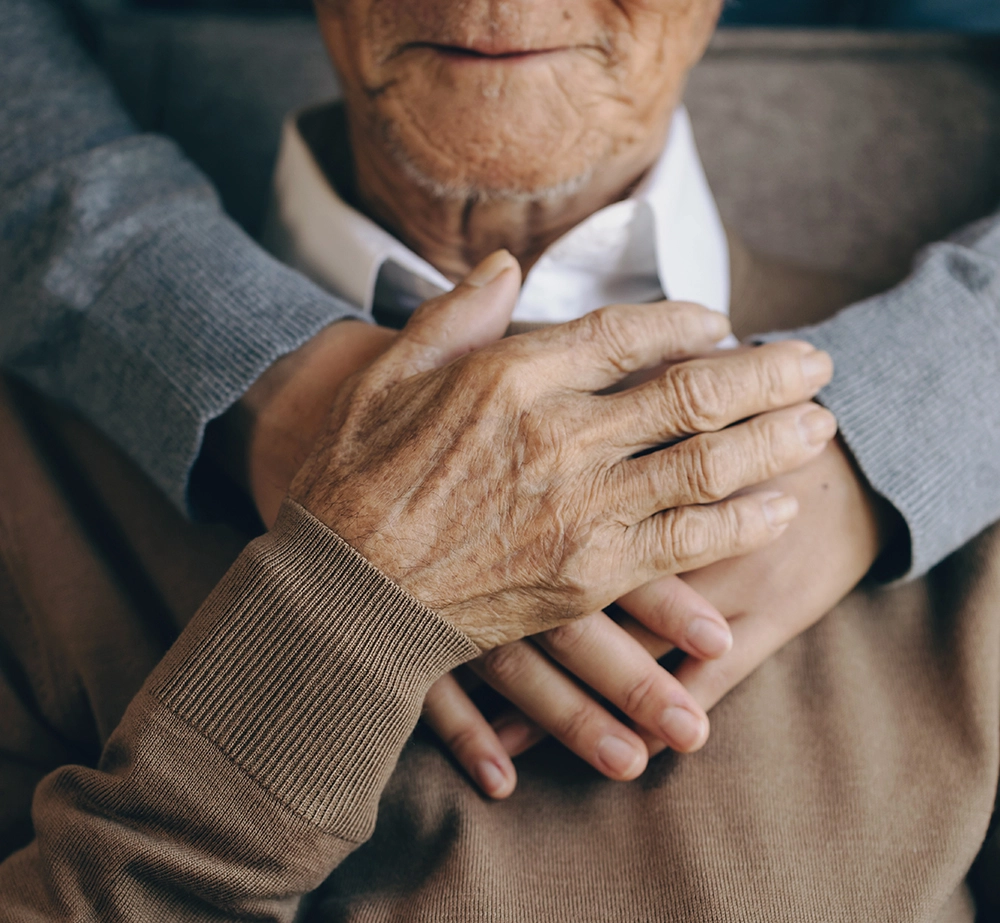Palliative Care to Ease Life
Are you or a loved one facing an incurable, progressive chronic and/or potentially life-threatening illness and looking for support to ensure the best possible quality of life?
Palliative genève has gathered all the useful contacts and information to help you easily find the support and guidance you need.

Palliative Care to Ease Life
Are you or a loved one facing an incurable, progressive chronic and/or potentially life-threatening illness and looking for support to ensure the best possible quality of life?
Palliative genève has gathered all the useful contacts and information to help you easily find the support and guidance you need.
PALLIATIVE CARE. FOR WHOM, WHY,
WHEN? WHO CAN BENEFIT FROM IT?
Anyone living with an illness can request palliative care, regardless of their age or diagnosis.
WHAT CAN PALLIATIVE CARE DO FOR ME?
Palliative care considers the person as a whole and does everything possible to preserve their quality of life within the limits imposed by the illness.
But what does that actually mean?
For several weeks or even years you have been living daily with a serious progressive illness that may impact your life expectancy in the short or long term.
Based on your needs, values and life perspectives, professionals from various disciplines such as doctors, nurses, dietitians, physiotherapists, chaplains and others work together to discuss possible treatments, care options and support with you and your loved ones.
In this way, palliative care helps make what is initially unacceptable become manageable moment by moment, while making the most of the time left to live.
It is with this perspective that palliative genève provides you with this website, where you will find various useful information directly answering your questions or offering links to other related organizations.

WHEN TO REQUEST A SPECIALIZED TEAM?
It is estimated that 80% of patients with incurable, terminal, and/or progressive chronic illnesses have needs that can be met through basic palliative care provided by their primary care physician and by home care services, nursing homes, or non-specialized hospital units.
As situations may become more complex, the need for specialized palliative care can arise, sometimes quickly or more gradually. To stabilize a precarious situation or in case of difficult-to-manage symptoms, patients may:
- be cared for in units specifically dedicated to palliative situations within hospitals
- receive follow-up care from mobile teams who visit patients at their place of residence (home, nursing homes, other institutions) or care (hospital) and whose role is to assist caregivers by advising and supporting them to improve the situation.
Here are some situations that often lead to the need for specialized palliative care:
- symptoms difficult to relieve
- family caregivers no longer able to handle an excessive burden
- family caregivers who are ill, exhausted or unavailable, or in social isolation
- severe anxiety, psychological distress of the patient, patient’s lack of understanding of their situation
- patient’s refusal of care
- aggression, agitation of the patient
- confused patient, not understanding that they are putting themselves in danger
- care and monitoring required exceeding the capabilities of the caregivers in charge
- ethical conflicts, care desired by the patient or relatives becoming inappropriate or a source of conflicts with the team in charge.

Atelier Derniers Secours
La mort fait partie de la vie, parlons-en !
The Last Aid workshops aim to raise awareness among participants about supporting their loved ones in the final moments of life, through four themes: death is a part of life, anticipating and preparing, relieving suffering, and saying goodbye.

DOCUMENTS AND INFORMATION FOR PATIENTS
AND LOVED ONES
CONCEPT AND PROGRAMS OF PALLIATIVE CARE
Explore the pages and download the content that interests you
Definition and History of Palliative Care
Palliative care supports the quality of life of patients and their loved ones in situations without the possibility of complete cure, which may be life-threatening.
It includes all measures of care, psychological, social and spiritual support useful for preventing and relieving symptoms and suffering.
It encourages the patient to make choices in order to anticipate complex end-of-life issues.
Learn more:
Definition and History of Palliative Care
National Strategy
The Confederation and the cantons have decided, within the framework of the “Swiss National Health Policy” platform, to promote palliative care in our country.
On October 22, 2009, the Swiss National Health Policy Dialogue adopted a “National Strategy for Palliative Care 2010 – 2012.”
Learn more:
National Strategy
Geneva Cantonal Program for the Development of Palliative Care
The Geneva Cantonal Program for the Development of Palliative Care 2020-2023 has been published.
cantonal_prog_palliative_care_2020-2023_final-version_september2019-2.pdf
LIVING WITH THE ILLNESS, ANTICIPATING
Pain Management
The information sheets developed by the HUG pain network help you understand pain treatments such as morphine.
Pediatric Palliative Care
End-of-Life Arrangements, Advance Directives
Everyone has the opportunity to anticipate how they wish to be cared for and supported at the end of life, as well as who will manage their affairs when they are no longer able to do so.
You will find explanations and templates related to advance directives and the mandate for incapacity by clicking on these
links :
FMH – Advance_directive_english.pdf
Swiss Red Cross – Advance directives (in French)
Power-of-attorney-for-incapacity-LCC.pdf (in French)
Pro Senectute – Docupass (paid model in French)
City of Geneva – Advance directives (in French)
Writing advance directives can raise questions, emotions, and sometimes hesitations, which is why it is often helpful to seek support.
In Geneva, there are individuals and organizations that can help you think through and formulate your advance directives :
Individuals :
- Your primary care physician, nurse, or social worker who monitors the patient in the hospital or at home.
- The social worker from your municipality’s social services/senior services department.
- Your loved ones.
Organizations in Geneva :
- Caritas Genève
- Geneva Red Cross
- IMAD : l’Équipe Interprofessionnelle Spécialisée en Oncologie (EISO), et la Consultation de Soins palliatifs à domicile (CoSPadom)
- Geneva League Against Cancer
- Pro Senectute Genève
Living Better with Cancer
The information sheets developed by the HUG oncology service cover all topics related to cancer, from cancer-related symptoms to treatments and their effects.
ACCOMPANYING PEOPLE AT THE END OF LIFE
Guide for Bereaved Relatives
Guide for Bereaved Relatives
Accompanying People at the End of Life - Guide for Relatives and Volunteers
Accompanying People at the End of Life – Guide for Relatives and Volunteers
FREQUENTLY ASKED QUESTIONS
My loved one with an advanced illness no longer wants to eat. I am worried. What are the common symptoms and problems experienced by patients with very advanced illness or at the end of life?
Weakness or extreme fatigue, loss of appetite or aversion to food, pain, sleep disturbances, shortness of breath, depression, and anxiety are very common. These symptoms can be managed if the care team identifies them. Please discuss them with your doctor and caregivers. Depending on the situation, various professionals may be involved, such as a dietitian, physiotherapist, psychologist, and others.
It is essential that nutritional issues be discussed in light of each patient’s therapeutic goals.
The onset of confusion is also very common. If you notice unusual or incoherent speech or behavior, excessive drowsiness, reversal of the day-night cycle (patient active and awake at night, sleeping during the day), loss of attention, or risky behavior, please inform the caregivers promptly to prevent caregiver exhaustion and to identify and treat the underlying causes.
Confusion requires urgent medical consultation as it may indicate an infection, dehydration, constipation, pain, or other potentially reversible medical issues. In all cases, appropriate treatment should be considered.
I Have Cancer. I Have many Questions about Cancer, Treatments, and the Support that Can be Offered.
Consult the HUG oncology service website and its thematic sheets on treatments, their effects, symptoms (nausea, pain, etc.).
I Feel I Need to Take Care of Myself to Cope with My Illness. I Would like to be Informed about Complementary and Non-Drug Therapies. Where Can I Find this Information?
Talk to your caregivers to explore together which therapy would suit you.
This may include acupuncture, osteopathy, sophrology, mindfulness-based stress reduction, therapeutic hypnosis, phytotherapy, homeopathy, aromatherapy, music therapy, Chinese medicine, Tai Chi, body image workshops, etc.
The OTIUM center supports you in living with or after cancer. Address: Place des Philosophes 18- 1205 Geneva. http://www.otium.center
My loved one wishes to spend their final days at home. I am worried that everything will fall on me and that I won’t know how to cope if problems arise. How can I prepare myself?
Discuss this with the doctor who will visit your loved one at home. They will determine the necessary support to put in place to assist you and ease your burden as much as possible.
To help you cope, it is important that you are informed about the possible complications that may arise (anxiety, agitation, intense shortness of breath, fever, seizures in case of brain tumor or metastases, vomiting, etc.) so you can respond appropriately. A plan will be established: who to call? what to do? which treatments to prioritize? what are the limits of home care?
Nursing follow-up will help detect emerging problems and address them as early as possible. Follow-up through a specialized consultation can also be arranged.
Most people surveyed would prefer to die at home. Despite this, many still pass away in care facilities where a team is available 24 hours a day. It is not advisable to keep a patient at home when the limits of caregivers or family supporters are exceeded.
My father, who has a chronic respiratory illness, is hospitalized. I find it hard to accept that he is being transferred to palliative care because he has recovered each time before.
It is likely that after each complication, their health condition has improved, but without truly returning to the state they were in before.
In cases of illnesses where health deteriorates slowly and progressively, it is sometimes difficult to realize that the progression towards worsening is very gradual yet inexorable. The patient continues to function despite increasing breathlessness, adapting their activities until every movement becomes extremely taxing, experiencing shortness of breath even at rest. This situation has therefore been palliative for some time.
The increasing frequency and shortening intervals between hospitalizations, difficulties with eating, weight loss, worsening shortness of breath, and extreme fatigue are signs indicating that the condition is very advanced.
Palliative care does not mean stopping all treatments. Only those treatments that no longer make sense for the patient are discontinued after careful discussion.
Treatments that can improve the patient’s comfort, particularly respiratory therapies such as physiotherapy, will be continued or initiated. Morphine can help the patient feel more comfortable and reduce the sensation of breathlessness.
My loved one has expressed a desire to die. What can healthcare providers do?
According to the Swiss Academy of Medical Sciences (SAMS) guidelines: When a patient expresses a wish to die, the care team must take this desire seriously and seek to understand its underlying reasons. Whether expressed implicitly or explicitly, requests to actively end life are based on very different motivations. Patients are often ambivalent; they simultaneously experience the desire to continue living and the desire to die. Wishes to die must be addressed openly and without judgment.
“Similarly, if a patient requests assisted suicide, it is a desire to die that must be carefully evaluated.”
To learn more: Download the PDF file “Attitude towards the end of life and death” from the SAMS website
I am considering stopping intensive treatments. Do I have the right to refuse them?
Yes, you have the right to refuse treatments that cause you more discomfort (e.g., severe fatigue, pain, nausea) and burdens than benefits.
Talk openly and simply with your doctor so they understand what you are experiencing right now. They will be able to fully inform you about your situation and the possible alternatives. Also, discuss it with your loved ones or trusted people to receive support during this decision-making process.
My loved one, who has a neurological disease, exhibits behavioral disorders, falls frequently, and is sometimes confused or uncooperative. I feel exhausted and depressed. What can I do?
In cases of diseases affecting the nervous system such as dementias, stroke with sequelae or limited recovery, Parkinson’s disease, Amyotrophic Lateral Sclerosis, and Huntington’s disease, maintaining care at home largely depends on the availability, physical and mental health, and support of caregivers.
Talk to the doctor about it.
If you don’t have home care assistance, it will be arranged. Associations specific to these diseases can help you. To learn more, click on the following link:
https://www.hug.ch/ressources-structures-soutien
If a comprehensive network of home care providers is already in place, a respite stay can be planned. Additional support services should be considered. Caregivers are available to assist you with social, psychological, practical, and other needs.
Hospitalization or placement in a nursing home may become necessary and should not be seen as a failure or abandonment, but rather as medium- to long-term options to be prepared for before a crisis or exhaustion occurs.
Is Palliative Care Intended for Patients other than those with Cancer?
Patients suffering from diseases that severely impair the function of vital organs such as the heart, kidneys, liver, lungs, or brain are likely to experience various distressing symptoms. Given the reduced duration and quality of life associated with these conditions, they may benefit from palliative care.
To learn more: https://www.hug.ch/…/multimorbidites2016.pdf
My father is exhausted after multiple hospital stays. He would like to spend his final days in his nursing home. Can we anticipate in case of a new health problem?
Yes, it is always better to anticipate new health complications, to avoid stressful situations involving urgent decisions, and to prevent disappointment or conflict in case of differing viewpoints between the patient, yourself, and the care team.
If your loved one is able to discuss these aspects and has not yet drafted advance directives, there is still time. Your support will be helpful in this process. You will find useful information in the following section: LIVING WITH YOUR ILLNESS / END-OF-LIFE ARRANGEMENTS
If you are the healthcare proxy for this person, you can meet with the care team to review the situation, discuss the presumed wishes of the individual, and make decisions in their best interest regarding the course of action to take in case of new complications.
To learn more: https://www.hug.ch/directives-anticipees/representant-therapeutique